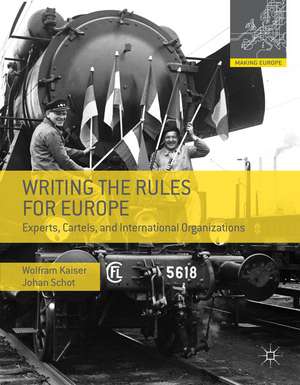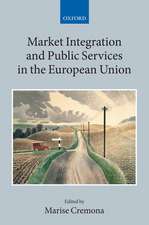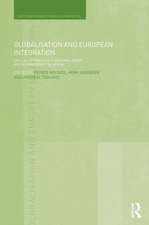Writing the Rules for Europe: Experts, Cartels, and International Organizations: Making Europe
Autor Wolfram Kaiser, Johan Schoten Limba Engleză Hardback – 19 noi 2014
| Toate formatele și edițiile | Preț | Express |
|---|---|---|
| Paperback (1) | 511.05 lei 6-8 săpt. | |
| Palgrave Macmillan UK – 23 aug 2018 | 511.05 lei 6-8 săpt. | |
| Hardback (1) | 532.48 lei 3-5 săpt. | |
| Palgrave Macmillan UK – 19 noi 2014 | 532.48 lei 3-5 săpt. |
Preț: 532.48 lei
Preț vechi: 626.44 lei
-15% Nou
Puncte Express: 799
Preț estimativ în valută:
101.89€ • 106.67$ • 84.31£
101.89€ • 106.67$ • 84.31£
Carte disponibilă
Livrare economică 15-29 martie
Preluare comenzi: 021 569.72.76
Specificații
ISBN-13: 9780230308077
ISBN-10: 0230308074
Pagini: 396
Ilustrații: XX, 396 p.
Dimensiuni: 189 x 246 x 33 mm
Greutate: 1.34 kg
Ediția:2014
Editura: Palgrave Macmillan UK
Colecția Palgrave Macmillan
Seria Making Europe
Locul publicării:London, United Kingdom
ISBN-10: 0230308074
Pagini: 396
Ilustrații: XX, 396 p.
Dimensiuni: 189 x 246 x 33 mm
Greutate: 1.34 kg
Ediția:2014
Editura: Palgrave Macmillan UK
Colecția Palgrave Macmillan
Seria Making Europe
Locul publicării:London, United Kingdom
Cuprins
Introduction. - 1. Origins of Technocratic Internationalism. - 2. The Power and Fragility of Experts. - 3. From Divided Europe to 'Core Europe'. - 4. Europe of the Standard Gauge. - 5. Tensions in Railway Europe 6. Canons and Cartels. - 7. Technology Cooperation in Steel Europe. - 8. Towards European Union Hegemony Conclusion
Recenzii
“Many studies have been done on Aristide Briand or Walter Rathenau, who led European integration efforts in France and Germany during the interwar year. There are fewer contributions on telecommunication or railway engineers, with a comparable focus on integration. Writing the Rules for Europe provides this rather neglected perspective. It is easy to read, but at the same time offers shrewd insights into the underlying technological structures of European integration, which should be valuable to scholars and the general public alike.” (Thomas Hoerber, Journal of Contemporary European Research JCER, Vol. 14 (03), 2018)
“Writing the Rules of Europe provides a 150-year history of the hidden expert-driven integration of Europe, which eventually led the EU to become the most important and contested producer of rules, regulations and systems for transnational interaction in Europe. … the book connects the history of technology, perspectives from transnational and global history, and European integration history in a way that is refreshing and, for the field of European integration history, absolutely vital.” (Haakon A. Ikonomou, European History Quarterly, Vol. 47 (3), July, 2017)
“The book is a guide to the processes which continue to be the hottest topics regarding Western Europe and the European Union itself. … If you are a historian of science and technology or a scholar of global and international history, you will be fascinated. If you are teaching or studying cultural history, sociology or political science consider this book as part of your reading list. … it is a book made of steel and worth reading.” (Lyubomir Pozharliev, KULT_online - Review Journal for the Study of Culture, Issue 51, July, 2017)
“The book offers an exciting new history of European integration, finding its answers in Europe’s long technological trajectories. … Writing the Rules of Europe is an important new book. In dismantling the political myth of Europe, the authors unearth a long-standing institutional history of competitive, international rule-writing, by expert committees and cartels, that helped link and define Europe technically.” (Elisabeth Van Meer, Technology and Culture, Vol. 57 (2), April, 2016)
“Writing the Rules of Europe provides a 150-year history of the hidden expert-driven integration of Europe, which eventually led the EU to become the most important and contested producer of rules, regulations and systems for transnational interaction in Europe. … the book connects the history of technology, perspectives from transnational and global history, and European integration history in a way that is refreshing and, for the field of European integration history, absolutely vital.” (Haakon A. Ikonomou, European History Quarterly, Vol. 47 (3), July, 2017)
“The book is a guide to the processes which continue to be the hottest topics regarding Western Europe and the European Union itself. … If you are a historian of science and technology or a scholar of global and international history, you will be fascinated. If you are teaching or studying cultural history, sociology or political science consider this book as part of your reading list. … it is a book made of steel and worth reading.” (Lyubomir Pozharliev, KULT_online - Review Journal for the Study of Culture, Issue 51, July, 2017)
“The book offers an exciting new history of European integration, finding its answers in Europe’s long technological trajectories. … Writing the Rules of Europe is an important new book. In dismantling the political myth of Europe, the authors unearth a long-standing institutional history of competitive, international rule-writing, by expert committees and cartels, that helped link and define Europe technically.” (Elisabeth Van Meer, Technology and Culture, Vol. 57 (2), April, 2016)
Notă biografică
Wolfram Kaiser is Professor of European Studies at the University of Portsmouth, UK, and Visiting Professor at the College of Europe, Belgium. He has published widely on European integration, Christian democracy and the history of globalisation. His books include (with S. Krankenhagen and K. Poehls) Exhibiting Europe in Museums: Transnational Networks, Collections, Narratives and Representations (2014), (ed. with J.-H. Meyer) Societal Actors in European Integration: Polity-building and Policy-making 1958-92, (ed. with A. Varsori) European Union History: Themes and Debates (Palgrave Macmillan, 2010); Christian Democracy and the Origins of European Union (2007).
Johan Schot is Director of the Science Policy Research Unit and Professor in History of Technology at Sussex University, UK. In 2009 he was elected to the Royal Netherlands Academy of Arts and Sciences (KNAW) for his interdisciplinary work. He has published widely in several fields, including Dutch and European history, innovation studies, and sustainable development. His books include (with John Grin, Jan Rotmans) Transitions Towards Sustainable Development: New Directions in the Study of Long Term Transformative Change (2010), and (ed. with Harry Lintsen and Arie Rip), Technology and the Making of the Netherlands: The Age of Contested Modernization, (2010).
Johan Schot is Director of the Science Policy Research Unit and Professor in History of Technology at Sussex University, UK. In 2009 he was elected to the Royal Netherlands Academy of Arts and Sciences (KNAW) for his interdisciplinary work. He has published widely in several fields, including Dutch and European history, innovation studies, and sustainable development. His books include (with John Grin, Jan Rotmans) Transitions Towards Sustainable Development: New Directions in the Study of Long Term Transformative Change (2010), and (ed. with Harry Lintsen and Arie Rip), Technology and the Making of the Netherlands: The Age of Contested Modernization, (2010).























